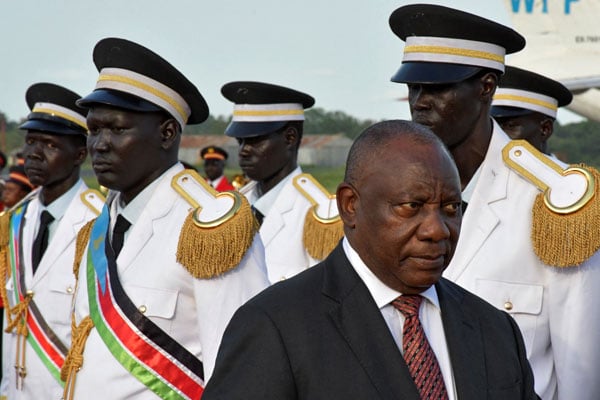Metropolitan physical planning authority awaits government approval

Congested. An aerial view of a section of Kampala Capital City. PHOTO BY MICHAEL KAKUMIRIZI.
What you need to know:
- The Mpigi District chairperson, Mr Peter Clever Mutuluza, decried the low funding from government which he said cripples physical planning in the district.
- Although he supports the implementation of the MPPA, he calls for the engagement of all stakeholders, arguing that if other players are excluded, its operationalisation could fail.
Kampala. As Kampala Capital City Authority (KCCA) rolls out the planning structure of the city, plans to extend the boundaries of Kampala City to include Wakiso, Mukono and Mpigi districts remain a faraway cry due to government’s delayed approval of the Metropolitan Physical Planning Authority, (MPPA).
This has in essence affected KCCA’s hope to extend services to the neighbouring areas.
Although Section 21 of the 2010 KCCA Act stipulates that there shall be the MPPA to handle and address planning issues within the capital city and the neighbouring districts of Wakiso, Mukono and Mpigi, the plan has remained on paper for six years since the establishment of the Act.
The MPPA is also supposed to plan major transportation, infrastructure, recreational parks, tree planting, approving the capital city, municipal and town structure plans and overseeing and monitoring the execution of the Metropolitan Authority Development Plan.
The stalled approval of the MPPA, authorities say, cripples their service delivery as far as city planning is concerned as there is no coordination with the metropolitan areas as provided for in the law.
Kampala Lord Mayor Erias Lukwago says majority of illegal buildings in the city have cropped up in the central business district due to absence of a clear neighbourhood planning system.
“I find it an absurdity for us as an institution to embark on and proceed with the implementation of multi-million dollar projects like the Kampala Institutional and Infrastructure Development project, Markets and Agricultural Trade Improvement Programme and others which involve developing smart city solutions and major civil works like construction of flyovers before rolling out a new physical development plan for Kampala,” Mr Lukwago says.
He accuses the Kampala minister, Ms Betty Kamya, of failing to appoint members of the MPPA as required by the Act to oversee physical planning in the Metropolitan area.
The MPPA
According to the Act, the MPPA shall consist of a chairperson and four other persons, all of whom shall be appointed by the minister with the approval of Cabinet, being persons qualified and experienced in physical planning, civil engineering, architecture, environment and public health or survey.
But the State minister for Kampala Affairs, Ms Benny Namugwanya, says the MPPA has stalled because the current KCCA Act doesn’t provide for its operationalisation. To operationalise it, Ms Namugwanya says the law has to be amended so that a secretariat to supervise the MPPA team is in place.
“The lack of the MPPA has had a negative impact on the development of the city because many structures are illegally sprouting out in the city and the neighbouring areas. However, when the law is amended, it will be operational because there will be the secretariat to supervise the team. It’s a serious matter that we are considering,” she says.
The KCCA Physical Development Policy is composed of three primary elements; strengthening existing urban centres in the Greater Kampala Metropolitan Area (GKMA), developing new satellite towns in the GKMA and continuing the process of KCCA as the core of the Metropolis and country.
However, efforts to achieve these development targets have since hit a deadlock because the MPPA on which they are supposed to be anchored has never been implemented.
Information available to this newspaper also shows that many city projects have since stalled because they can’t be expedited if the MPPPA isn’t operationalised.
KCCA director of physical planning Moses Atwine Kanunira says when the MPPA was crafted, it wasn’t given proper explanation in the law on who could finance it, adding that it’s a very hard venture for KCCA to finance yet its budget is very meagre.
He explains that the lack of the MPPA drains KCCA’s budget as it keeps providing services to the people who come from the metropolitan districts to work in the city.
Mr Atwine reveals that the directorate of physical planning only depends on local revenue, adding that this can’t support them to embark on planning in areas outside the city.
However, Mr Atwiine observes that one of the major hindrances to city planning in the city is the land tenure system, where majority of people are tenants on Kabaka’s land and hence they don’t have land titles.
As a result, Mr Atwine adds, such people end up erecting buildings without approved plans because they don’t have land titles, which is a major requirement for the physical planning department before approving any building plan.
Wakiso District chairperson Matia Lwanga Bwanika paints a pale picture of the MMPA, arguing that it’s bound to fail, given the current setting of the Metropolitan districts, which he says are under the local government system yet Kampala is managed by KCCA.
To operationalise the MPPA, Mr Lwanga notes that both the administrative, structural and legal framework must be well defined.
The Mpigi District chairperson, Mr Peter Clever Mutuluza, decried the low funding from government which he said cripples physical planning in the district.
Although he supports the implementation of the MPPA, he calls for the engagement of all stakeholders, arguing that if other players are excluded, its operationalisation could fail.




